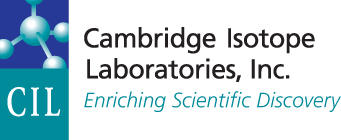Stable Isotopes and Stable Isotope-Labeled Compounds
CIL specializes in the process of labeling biochemical and organic compounds with highly enriched, stable (nonradioactive) isotopes of carbon, hydrogen, nitrogen, and oxygen. These stable isotopes are utilized in laboratories worldwide for research applications and in industry for commercial applications.
New Products
CIL is constantly pushing the limits of stable isotopes and continuously developing products to help support your research. We are pleased to offer the following new products!
All Products
CIL’s inventory consists of more than 11,500 compounds, which are used in research, environmental, pharmaceutical, medical diagnostic, electronics, and industrial applications worldwide.
Life Sciences
CIL leverages its expertise in stable isotopes and stable isotope-labeled compounds to develop innovative, targeted products to support life sciences laboratories throughout the world.
Applied Markets
CIL products support the development and commercialization of novel technologies and medical tests in varying industrial applications.
➤ Deuterated Reagents for Electronics
➤ Deuterated Reagents for Pharmaceuticals
➤ Quantum Applications
➤ Flavors and Fragrances
➤ Urea Breath Test
➤ Hydrology
Chemical Structure Database
COMING SOON!
D2O Recovery Program
Did you know CIL has a D2O Recovery Program for used and unused D2O?
Webinars
Check out our recorded webinars featuring presentations from top-ranked scientists on the wide-ranging applications of stable isotopes.
Careers
Apply your talents to make a difference! Join us as we drive the expansion of stable-isotope applications with innovative product development.
